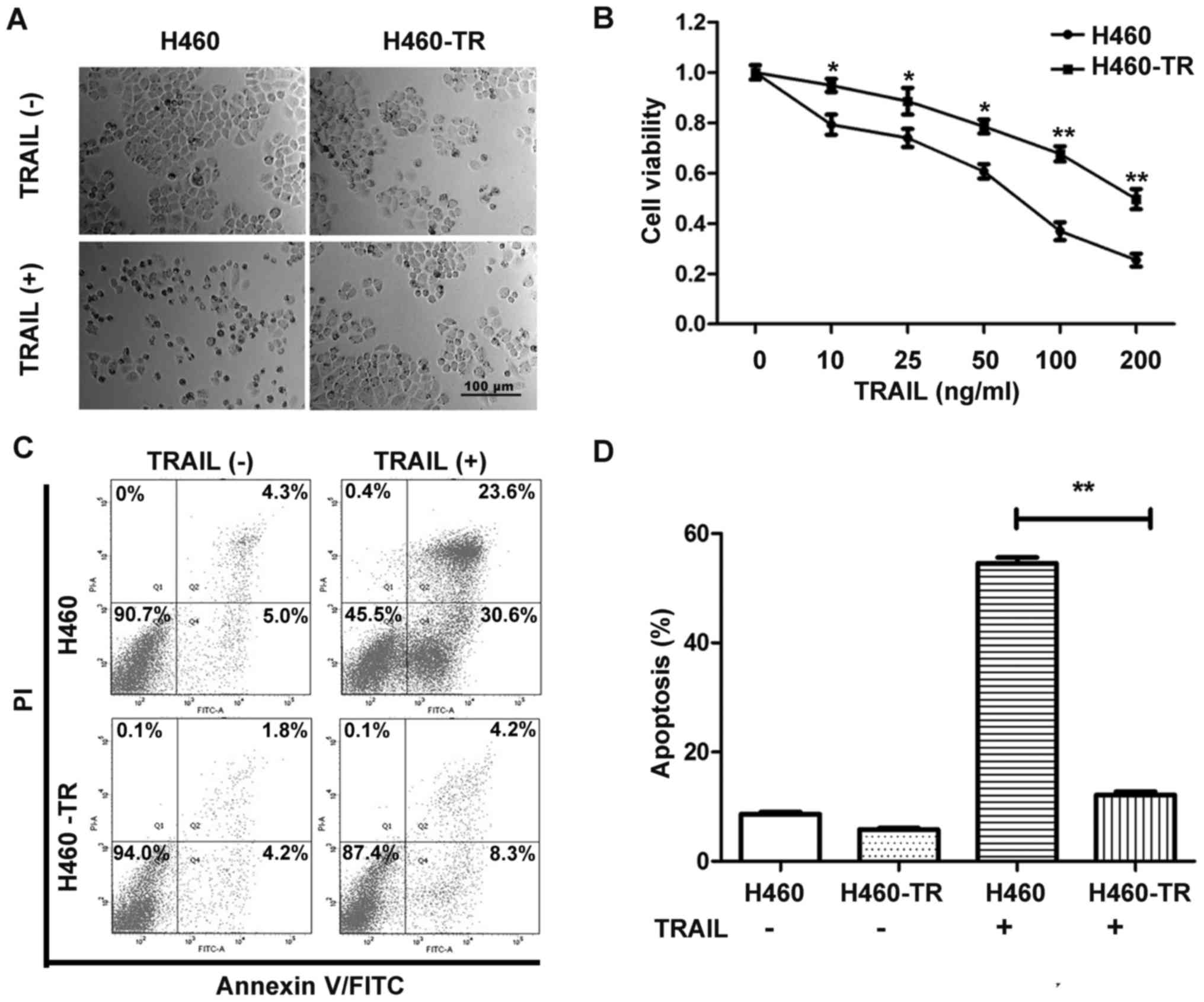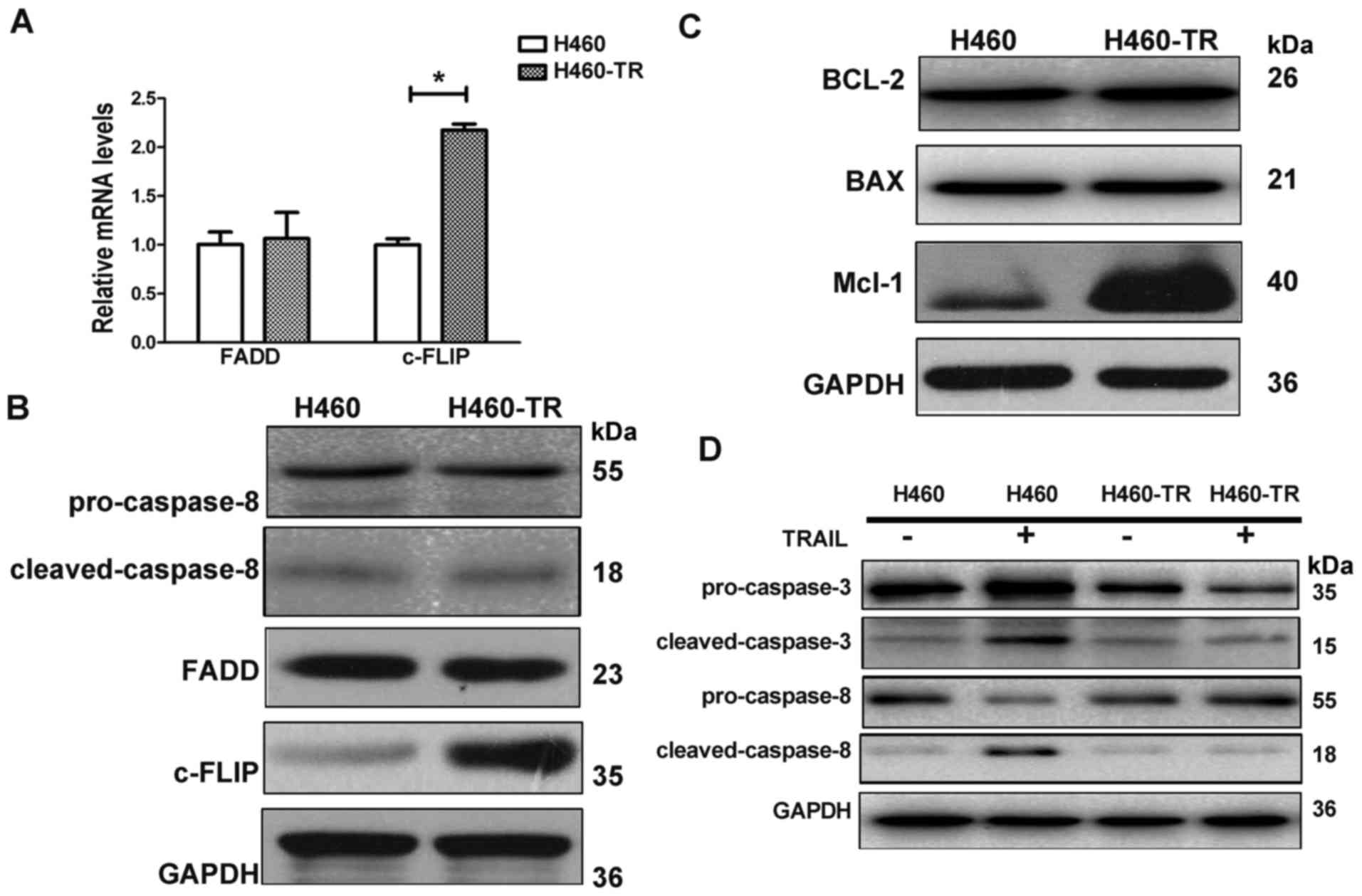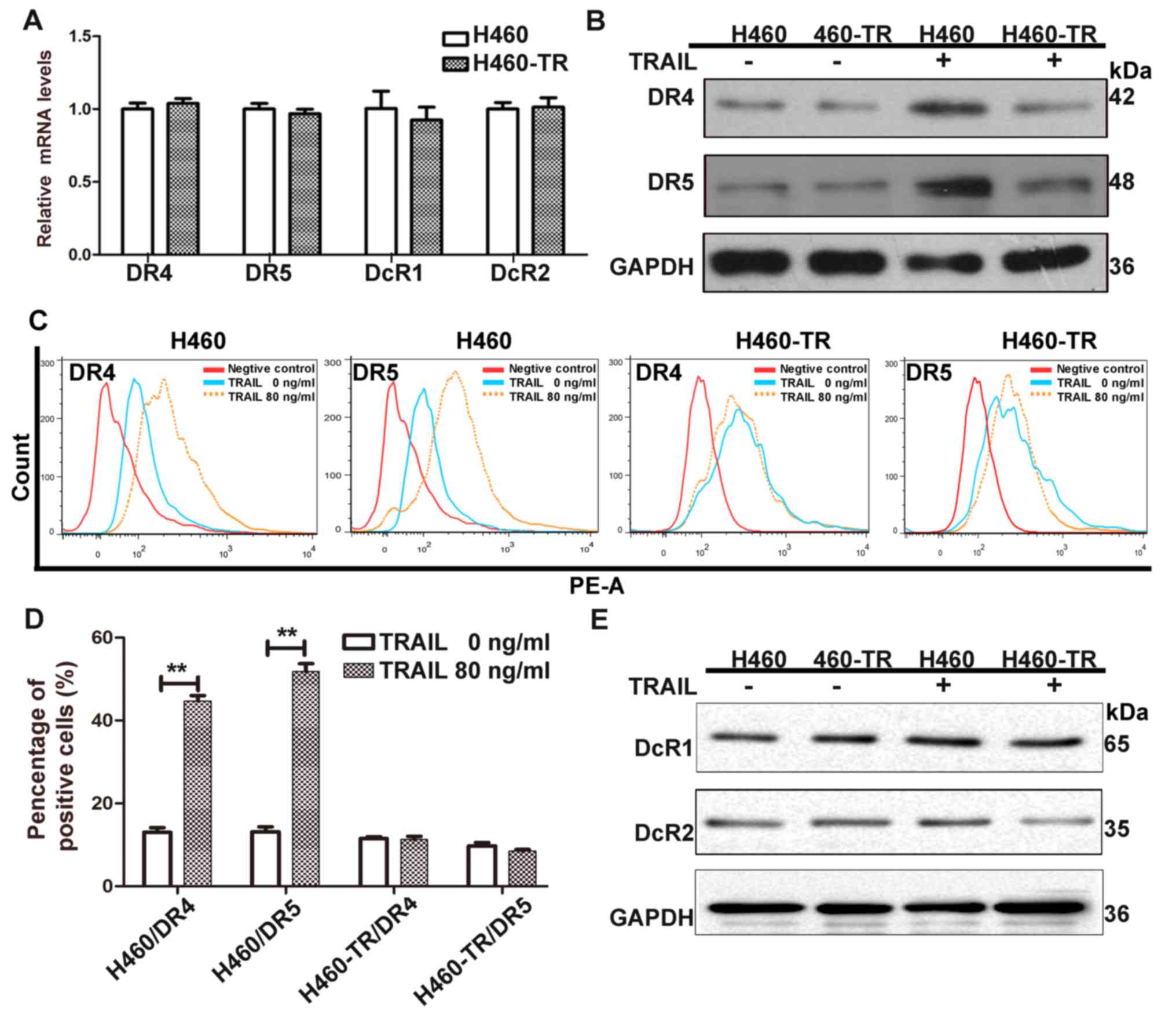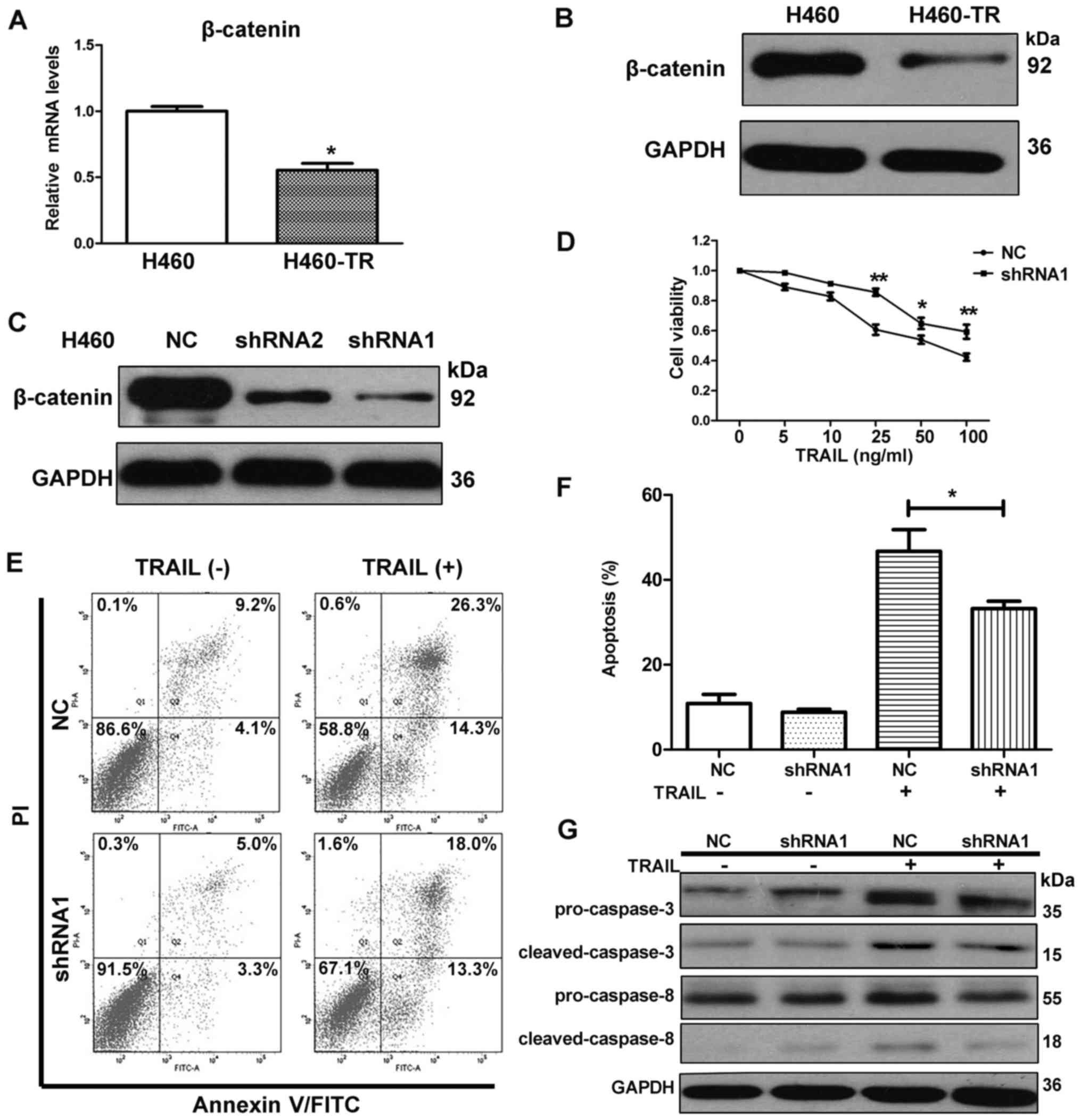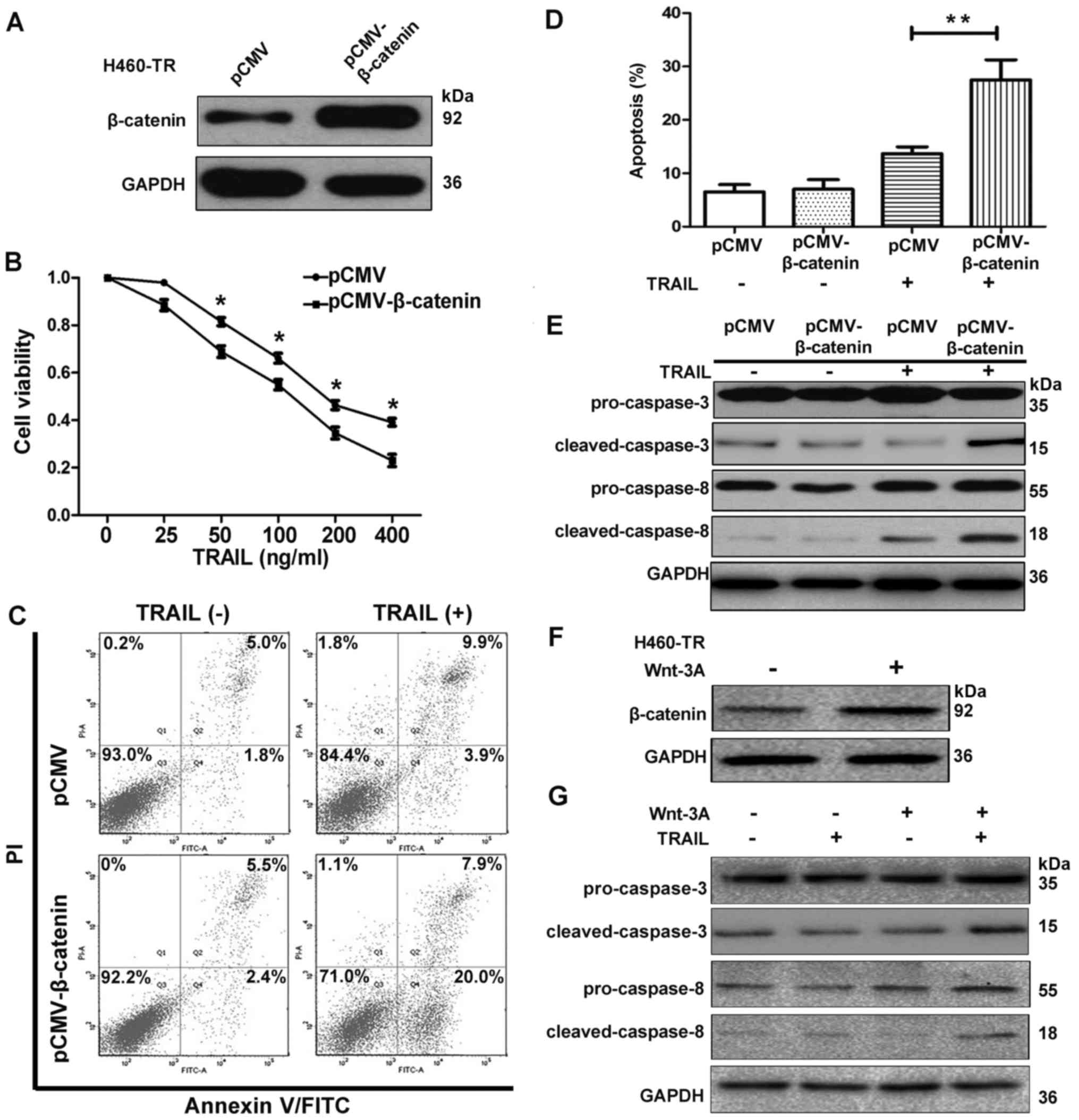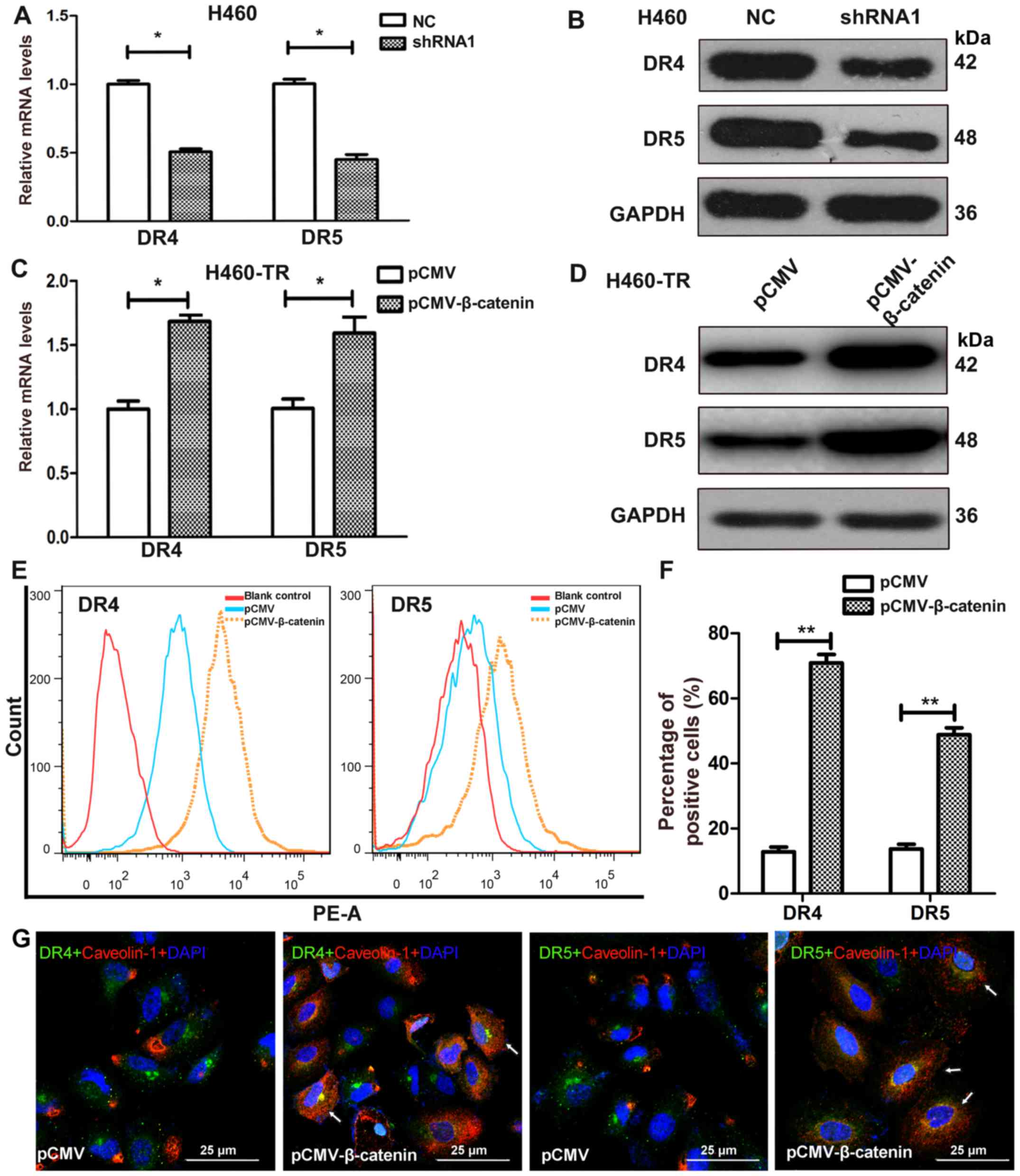|
1
|
Chen W, Zheng R, Baade PD, Zhang S, Zeng
H, Bray F, Jemal A, Yu XQ and He J: Cancer statistics in China,
2015. CA Cancer J Clin. 66:115–132. 2016. View Article : Google Scholar : PubMed/NCBI
|
|
2
|
Cao C, D’Amico T, Demmy T, Dunning J,
Gossot D, Hansen H, He J, Jheon S, Petersen RH, Sihoe A, et al
International VATS Interest Group: Surgery versus SABR for
resectable non-small-cell lung cancer. Lancet Oncol. 16:e370–e371.
2015. View Article : Google Scholar : PubMed/NCBI
|
|
3
|
Wiley SR, Schooley K, Smolak PJ, Din WS,
Huang CP, Nicholl JK, Sutherland GR, Smith TD, Rauch C, Smith CA,
et al: Identification and characterization of a new member of the
TNF family that induces apoptosis. Immunity. 3:673–682. 1995.
View Article : Google Scholar : PubMed/NCBI
|
|
4
|
Hao C, Song JH, Hsi B, Lewis J, Song DK,
Petruk KC, Tyrrell DL and Kneteman NM: TRAIL inhibits tumor growth
but is nontoxic to human hepatocytes in chimeric mice. Cancer Res.
64:8502–8506. 2004. View Article : Google Scholar : PubMed/NCBI
|
|
5
|
Pitti RM, Marsters SA, Ruppert S, Donahue
CJ, Moore A and Ashkenazi A: Induction of apoptosis by Apo-2
ligand, a new member of the tumor necrosis factor cytokine family.
J Biol Chem. 271:12687–12690. 1996. View Article : Google Scholar : PubMed/NCBI
|
|
6
|
Ashkenazi A: Directing cancer cells to
self-destruct with pro-apoptotic receptor agonists. Nat Rev Drug
Discov. 7:1001–1012. 2008. View
Article : Google Scholar : PubMed/NCBI
|
|
7
|
Hotte SJ, Hirte HW, Chen EX, Siu LL, Le
LH, Corey A, Iacobucci A, MacLean M, Lo L, Fox NL, et al: A phase 1
study of mapatumumab (fully human monoclonal antibody to TRAIL-R1)
in patients with advanced solid malignancies. Clin Cancer Res.
14:3450–3455. 2008. View Article : Google Scholar : PubMed/NCBI
|
|
8
|
Merchant MS, Geller JI, Baird K, Chou AJ,
Galli S, Charles A, Amaoko M, Rhee EH, Price A, Wexler LH, et al:
Phase I trial and pharmacokinetic study of lexatumumab in pediatric
patients with solid tumors. J Clin Oncol. 30:4141–4147. 2012.
View Article : Google Scholar : PubMed/NCBI
|
|
9
|
Greco FA, Bonomi P, Crawford J, Kelly K,
Oh Y, Halpern W, Lo L, Gallant G and Klein J: Phase 2 study of
mapatumumab, a fully human agonistic monoclonal antibody which
targets and activates the TRAIL receptor-1, in patients with
advanced non-small cell lung cancer. Lung Cancer. 61:82–90. 2008.
View Article : Google Scholar : PubMed/NCBI
|
|
10
|
Ashkenazi A, Pai RC, Fong S, Leung S,
Lawrence DA, Marsters SA, Blackie C, Chang L, McMurtrey AE, Hebert
A, et al: Safty and antitumor activity of recombinant soluble Apo 2
ligand. J Clin Invest. 104:155–162. 1999. View Article : Google Scholar : PubMed/NCBI
|
|
11
|
Hao C, Beguinot F, Condorelli G, Trencia
A, Van Meir EG, Yong VW, Parney IF, Roa WH and Petruk KC: Induction
and intracellular regulation of tumor necrosis factor-related
apoptosis-inducing ligand (TRAIL) mediated apotosis in human
malignant glioma cells. Cancer Res. 61:1162–1170. 2001.PubMed/NCBI
|
|
12
|
Jalving M, Heijink DM, Koornstra JJ,
Boersma-van Ek W, Zwart N, Wesseling J, Sluiter WJ, de Vries EG,
Kleibeuker JH and de Jong S: Regulation of TRAIL receptor
expression by β-catenin in colorectal tumours. Carcinogenesis.
35:1092–1099. 2014. View Article : Google Scholar : PubMed/NCBI
|
|
13
|
Lu M, Marsters S, Ye X, Luis E, Gonzalez L
and Ashkenazi A: E-cadherin couples death receptors to the
cytoskeleton to regulate apoptosis. Mol Cell. 54:987–998. 2014.
View Article : Google Scholar : PubMed/NCBI
|
|
14
|
Yang B, Zhang S, Wang Z, Yang C, Ouyang W,
Zhou F, Zhou Y and Xie C: Deubiquitinase USP9X deubiquitinates
β-catenin and promotes high grade glioma cell growth. Oncotarget.
7:79515–79525. 2016. View Article : Google Scholar : PubMed/NCBI
|
|
15
|
Livak KJ and Schmittgen TD: Analysis of
relative gene expression data using real-time quantitative PCR and
the 2(-Delta Delta C(T)) method. Methods. 25:402–408. 2001.
View Article : Google Scholar
|
|
16
|
Rudner J, Jendrossek V, Lauber K, Daniel
PT, Wesselborg S and Belka C: Type I and type II reactions in
TRAIL-induced apoptosis - results from dose-response studies.
Oncogene. 24:130–140. 2005. View Article : Google Scholar
|
|
17
|
Ozören N and El-Deiry WS: Defining
characteristics of types I and II apoptotic cells in response to
TRAIL. Neoplasia. 4:551–557. 2002. View Article : Google Scholar : PubMed/NCBI
|
|
18
|
de Miguel D, Lemke J, Anel A, Walczak H
and Martinez-Lostao L: Onto better TRAILs for cancer treatment.
Cell Death Differ. 23:733–747. 2016. View Article : Google Scholar : PubMed/NCBI
|
|
19
|
Teng Y, Gao M, Wang J, Kong Q, Hua H, Luo
T and Jiang Y: Inhibition of eIF2α dephosphorylation enhances
TRAIL-induced apoptosis in hepatoma cells. Cell Death Dis.
5:e10602014. View Article : Google Scholar
|
|
20
|
Fan S, Li Y, Yue P, Khuri FR and Sun SY:
The eIF4E/eIF4G interaction inhibitor 4EGI-1 augments
TRAIL-mediated apoptosis through c-FLIP down-regulation and DR5
induction independent of inhibition of cap-dependent protein
translation. Neoplasia. 12:346–356. 2010. View Article : Google Scholar : PubMed/NCBI
|
|
21
|
Haimovici A, Humbert M, Federzoni EA,
Shan-Krauer D, Brunner T, Frese S, Kaufmann T, Torbett BE and
Tschan MP: PU.1 supports TRAIL-induced cell death by inhibiting
NF-κB-mediated cell survival and inducing DR5 expression. Cell
Death Differ. 24:866–877. 2017. View Article : Google Scholar : PubMed/NCBI
|
|
22
|
Mert U and Sanlioglu AD: Intracellular
localization of DR5 and related regulatory pathways as a mechanism
of resistance to TRAIL in cancer. Cell Mol Life Sci. 74:245–255.
2017. View Article : Google Scholar
|
|
23
|
Safa AR and Pollok KE: Targeting the
anti-apoptotic protein c-FLIP for cancer therapy. Cancers (Basel).
3:1639–1671. 2011. View Article : Google Scholar
|
|
24
|
Chen F, Guo J, Zhang Y, Zhao Y, Zhou N,
Liu S, Liu Y and Zheng D: Knockdown of c-FLIP(L) enhanced AD5-10
anti-death receptor 5 monoclonal antibody-induced apoptosis in
human lung cancer cells. Cancer Sci. 100:940–947. 2009. View Article : Google Scholar : PubMed/NCBI
|
|
25
|
Jeon MY, Min KJ, Woo SM, Seo SU, Kim S,
Park JW and Kwon TK: Volasertib enhances sensitivity to TRAIL in
renal carcinoma Caki cells through downregulation of c-FLIP
expression. Int J Mol Sci. 18:1–12. 2017. View Article : Google Scholar
|
|
26
|
Murphy ÁC, Weyhenmeyer B, Noonan J,
Kilbride SM, Schimansky S, Loh KP, Kögel D, Letai AG, Prehn JH and
Murphy BM: Modulation of Mcl-1 sensitizes glioblastoma to
TRAIL-induced apoptosis. Apoptosis. 19:629–642. 2014. View Article : Google Scholar :
|
|
27
|
Azijli K1, Yuvaraj S, van Roosmalen I,
Flach K, Giovannetti E, Peters GJ, de Jong S and Kruyt FA: MAPK p38
and JNK have opposing activities on TRAIL-induced apoptosis
activation in NSCLC H460 cells that involves RIP1 and caspase-8 and
is mediated by Mcl-1. Apoptosis. 18:851–860. 2013. View Article : Google Scholar : PubMed/NCBI
|
|
28
|
Woo SM, Min KJ, Seo BR and Kwon TK: YM155
sensitizes TRAIL-induced apoptosis through cathepsin S-dependent
down-regulation of Mcl-1 and NF-κB-mediated down-regulation of
c-FLIP expression in human renal carcinoma Caki cells. Oncotarget.
7:61520–61532. 2016. View Article : Google Scholar : PubMed/NCBI
|
|
29
|
Jin Z, McDonald ER III, Dicker DT and
El-Deiry WS: Deficient tumor necrosis factor-related
apoptosis-inducing ligand (TRAIL) death receptor transport to the
cell surface in human colon cancer cells selected for resistance to
TRAIL-induced apoptosis. J Biol Chem. 279:35829–35839. 2004.
View Article : Google Scholar : PubMed/NCBI
|
|
30
|
Ouyang W, Yang C, Zhang S, Liu Y, Yang B,
Zhang J, Zhou F, Zhou Y and Xie C: Absence of death receptor
translocation into lipid rafts in acquired TRAIL-resistant NSCLC
cells. Int J Oncol. 42:699–711. 2013. View Article : Google Scholar
|
|
31
|
Inamura K: Lung Cancer: Understanding its
molecular pathology and the 2015 WHO classification. Front Oncol.
7:1932017. View Article : Google Scholar : PubMed/NCBI
|
|
32
|
Polakis P: Drugging Wnt signalling in
cancer. EMBO J. 31:2737–2746. 2012. View Article : Google Scholar : PubMed/NCBI
|
|
33
|
Valenta T, Hausmann G and Basler K: The
many faces and functions of β-catenin. EMBO J. 31:2714–2736. 2012.
View Article : Google Scholar : PubMed/NCBI
|
|
34
|
Zimmerman ZF, Kulikauskas RM, Bomsztyk K,
Moon RT and Chien AJ: Activation of Wnt/β-catenin signaling
increases apoptosis in melanoma cells treated with trail. PLoS One.
8:e695932013. View Article : Google Scholar
|
|
35
|
Lan Y, Liu X, Zhang R, Wang K, Wang Y and
Hua ZC: Lithium enhances TRAIL-induced apoptosis in human lung
carcinoma A549 cells. Biometals. 26:241–254. 2013. View Article : Google Scholar : PubMed/NCBI
|
|
36
|
Zhang L, Ren X, Alt E, Bai X, Huang S, Xu
Z, Lynch PM, Moyer MP, Wen XF and Wu X: Chemoprevention of
colorectal cancer by targeting APC-deficient cells for apoptosis.
Nature. 464:1058–1061. 2010. View Article : Google Scholar : PubMed/NCBI
|
|
37
|
Wu X, Deng G, Hao X, Li Y, Zeng J, Ma C,
He Y, Liu X and Wang Y: A caspase-dependent pathway is involved in
Wnt/β-catenin signaling promoted apoptosis in Bacillus
Calmette-Guerin infected RAW264.7 macrophages. Int J Mol Sci.
15:5045–5062. 2014. View Article : Google Scholar : PubMed/NCBI
|
|
38
|
Galbiati F, Volonte D, Brown AM, Weinstein
DE, Ben-Ze’ev A, Pestell RG and Lisanti MP: Caveolin-1 expression
inhibits Wnt/beta-catenin/Lef-1 signaling by recruiting
beta-catenin to caveolae membrane domains. J Biol Chem.
275:23368–23377. 2000. View Article : Google Scholar : PubMed/NCBI
|
|
39
|
Gajate C and Mollinedo F:
Cytoskeleton-mediated death receptor and ligand concentration in
lipid rafts forms apoptosis-promoting clusters in cancer
chemotherapy. J Biol Chem. 280:11641–11647. 2005. View Article : Google Scholar : PubMed/NCBI
|
|
40
|
Brozovic A: The relationship between
platinum drug resistance and epithelial-mesenchymal transition.
Arch Toxicol. 91:605–619. 2017. View Article : Google Scholar
|















